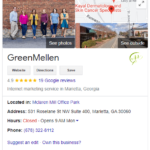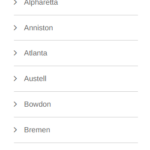Reading Time: 2 min When companies invest in SEO (Search Engine Optimization), their main focus is on unbranded terms. For example, if you’re a roofer you might be trying to rank for things like “roof replacement”, “roofing in Marietta” and other terms like that. This is a fantastic approach, but it often overshadows the value of focusing on your […]
Websites
The internet was better when people weren’t afraid to link out
Reading Time: 2 min Over the past decade, presumably to try to help their websites rank higher in Google, most websites just don’t link out to others anymore. It’s common to read a news article that mentions an event or a video, but then the article doesn’t link to the source. That’s not by accident, as they’re trying to […]
Tax the things you want to see less of
Reading Time: 2 min Taxes can serve a few purposes — they can help bring in more money to the government, and they can encourage people to do less of a particular behavior (and often they do both). Toll lanes bring in revenue but also limit who is on them so that they’re a faster way to go. If […]
Always build the foundation first
Reading Time: < 1 min I love the processes behind the work we do at GreenMellen. By taking things in the right order, the results are far more likely to be successful. However, there is a downside to this approach; you can’t just jump into the middle of a campaign and hope to be successful. In the book “The Dichotomy […]
Your real customers are a level or two deeper
Reading Time: 2 min In any kind of marketing it’s essential to know who your real customers are, but it’s sometimes a little trickier than it might seem. As I shared earlier this year, the people that we build websites for aren’t the ones that we’re actually building them for. When we build a site for a client, we’re […]
“Make it darker” is not an acceptable form of feedback
Reading Time: 2 min Feedback can be a wonderful thing, as I’ve shared many times on here (like “Feedback is a gift“), but only if it’s the right kind of feedback. If someone says “I like it“, that’s not very helpful, because our clients are not the people that we build websites for. Their liking it or not is […]
20 years of WordPress
Reading Time: 2 min It feels hard for me to believe, but today is the 20th anniversary of the first release of WordPress (you can see the initial announcement here). The story of WordPress actually began earlier, with a project called b2/cafelog in 2001. It was a similar product that was essentially abandoned by its creators, so Matt Mullenweg […]
Location pages are no longer helpful for SEO
Reading Time: 2 min Nearly a decade ago, I wrote a post explaining how Google doesn’t really change the rules when it comes to search engine optimization (SEO). While they change the algorithm quite often, virtually all of those changes are simply to tighten up what they’ve been telling us for years. Now they’re coming after useless “location pages” […]
The lock icon in your browser is going away because people don’t understand what it means
Reading Time: 2 min Web browsers have had the padlock icon next to the website addresses for years to show that the site has an SSL certificate and that your data is protected between you and that website. For years it was mostly just ecommerce that had that, but in 2017 Google started pushing all sites to use SSL. […]
Empathetic Marketing
Reading Time: 3 min The single best thing you can do with your marketing is to always keep the end user in mind. When we build websites for our customers, we frequently remind them that the site is not for them — it’s for their customers. A common joke among web designers is that clients always seem to want […]








